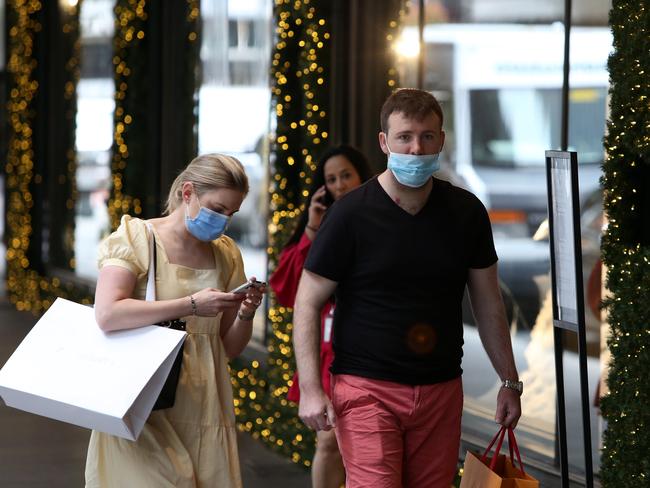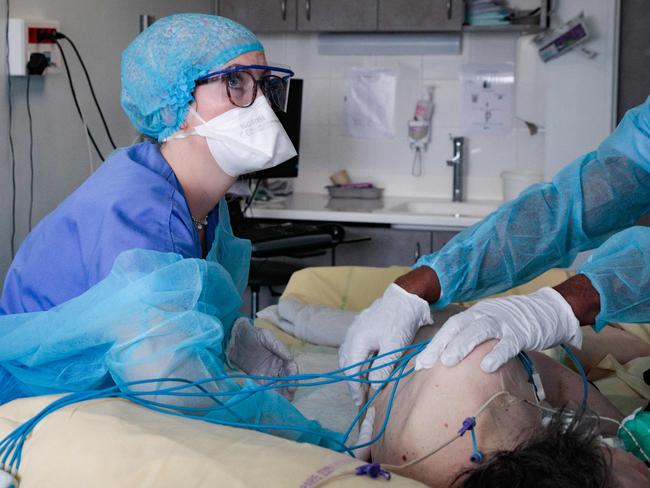Experts answer the most Googled Omicron questions in Australia
These are the questions Australians ask most online about the Omicron Covid variant. We sought answers from the experts.
National
Don't miss out on the headlines from National. Followed categories will be added to My News.
As Omicron spreads across the country, Australians’ thirst for answers deepens.
The new variant is in every Australian state and territory – not even Western Australia could stop it.
With a lack of concrete information on the new infection, Australians are turning to Dr Google for answers.
We put the top Omicron questions Australians are asking on the internet search engine according to data from Google Trends Australia, to virologist Professor Sarah Palmer, Co-Director, Centre for Virus Research, The Westmead Institute for Medical Research and epidemiologist Professor Adrian Esterman, ex-WHO currently at the University of South Australia.
IS OMICRON LESS SEVERE?
Prof Palmer: Some earlier reports from South Africa have indicated that the disease experienced from Omicron is less severe. However, due to the infectiousness of this variant, and the number of persons becoming infected, hospitals in some countries are becoming overwhelmed with Covid-19 patients infected with Omicron. In addition, many persons are vaccinated, have received boosters, or have experienced natural SARS-CoV-2 infection; all of which could help to mitigate side-effects or severity of an infection with the Omicron variant.
Professor Esterman: Early evidence is that it is substantially milder than Delta. But we are still waiting for confirmation, which should be available in the next two to three weeks
WHAT ARE THE SYMPTOMS OF OMICRON?
Professor Palmer: Based on early reports, which will have to be followed up with scientific studies, the major symptoms are cough, fatigue or tiredness, congestion, runny nose and shortness of breath. Those infected with Omicron do not seem to lose their sense of taste or smell.
Professor Esterman: Many infected people don’t have symptoms. For those who do, they appear to be similar to a nasty cold – sore throat, cough, sneezing, fever, headache. Unlike previous variants, there appears to be no loss of smell or taste. However, this is based on very early data, and might well change.

HOW LONG DOES OMICRON LAST?
Professor Palmer: Due to the infectiousness of this variant, the incubation time from exposure to infection appears to be shorter with infection happening as soon as three days after exposure. This could indicate that the course of infection caused by Omicron may be shorter but we need more data to be sure this is the case. Many variables can affect the duration of infection these include age, underlying health problems and vaccination status.
Professor Esterman: This is unclear. Potentially shorter than Delta, but we need confirmation.
IS ASTRAZENECA EFFECTIVE AGAINST IT?
Prof Palmer: On Thursday, the makers of the AstraZeneca vaccine reported that a booster from their vaccine increased antibody levels against the Omicron variant. This booster increased antibodies to a higher level compared to individuals previously infected by SARS-CoV-2 and recovered from their infection.
Prof Esterman: Two doses of AZ still provide good protection against severe disease and death, but provide little protection against infection.
HOW CONTAGIOUS IS OMICRON?
Professor Palmer: This is a very contagious viral variant. It replicates 70 times faster than the Delta variant in human airways, especially the upper respiratory airways where the viral infection is first established. It is also three times more infectious than the Delta variant, and this explains why Omicron is fast becoming the dominant infecting variant worldwide. The spike protein of the Omicron variant contains genetic changes which enhances the infectiousness of this variant.
Professor Esterman: Early indications are that it is about twice as transmissible as Delta, with an R0 of 10.
IS OMICRON MILDER THAN DELTA?
Professor Palmer: Omicron is definitely more infectious than the Delta variant. Whether Omicron causes a milder disease is still being studied. A recent study from Hong Kong indicated that Omicron does not replicate as well in cells found deep inside the lung, so this may indicate the Omicron variant causes a milder disease, but more studies are required to absolutely confirm this is the case.
Prof Esterman: See answer to 1 above.
WHY DID COVID JUMP FROM OMICRON TO DELTA?
Professor Palmer: Omicron is becoming the dominant infecting variant because it replicates faster in the upper respiratory tissue than Delta and is more infectious than Delta.
Professor Esterman: The virus is constantly mutating. The vast majority of mutations do not survive, but every now and then, a variant comes along that gives the new variant a survival advantage over previous ones.
IS OMICRON DANGEROUS?
Professor Palmer: The Omicron variant can cause serious disease and death in those people who are not vaccinated. It also remains dangerous for individuals who are elderly, immunocompromised, and/or have underlying health conditions even if they are vaccinated.

WHY ARE THE COVID VARIANTS NAMED AFTER GREEK LETTERS?
Professor Palmer: Typically, the International Committee on Taxonomy of Viruses categorises and creates the classifications for new viruses and viral variants which are a mixture of numbers and letters. SARS-CoV-2 was replicating so fast and developing so many new variants, it was decided to use Greek letters; this is a new viral classification system specifically for this virus.
Professor Esterman: Because WHO didn’t want to use the country where the variant was first found because of the stigma attached to it. When we run out of Greek letters (24 of them), WHO will probably move to star constellations.
WHICH VACCINE FOR OMICRON?
Professor Palmer: The goal of the vaccines is to protect a person from infection and serious disease. Therefore, the best vaccine is the one you have access to. The vaccines now available in Australia all prevent serious disease from the Omicron variant. However, to maintain this protection boosters are required four to six months after the second vaccination for all vaccines available in Australia.
More Coverage
Originally published as Experts answer the most Googled Omicron questions in Australia
Read related topics:Explainers





